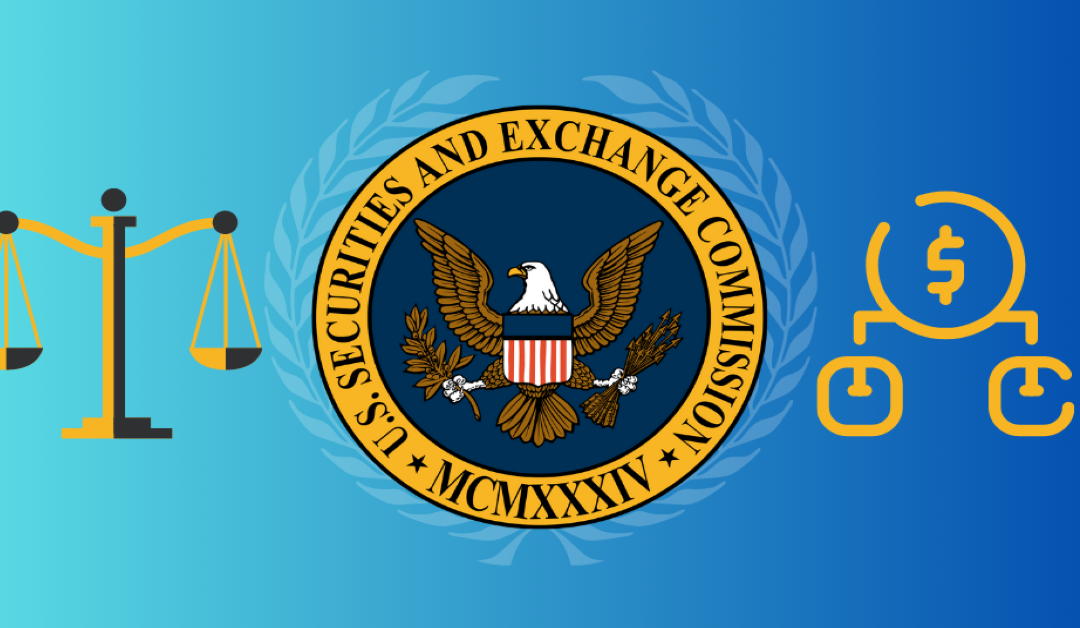
by Baraza Dan | Jul 5, 2023 | Regulation
opinion
A sticky situation persists in the crypto ecosystem as regulators pledge to ‘spring clean’ the entire industry. What started as a juvenile attack on crypto is now almost a full-blown annihilation of an industry whose promise at genesis was financial freedom. The beacon of hope for the unbanked is now subject to the unrelenting matching of regulators towards its end.
Born with a great ambition of mimicking and surpassing traditional finance, crypto continues to suffer life-ending attacks from regulators. Is there any end to the onslaught? You tell me!
Exchange exodus from Canada
The genesis of regulatory uncertainty birthed the exodus of crypto exchanges from Canada. The latest in the frenzy of exits is Binance which announced a Canadian market exit in mid-May. The reason per se, Binance says, is the harsh regulatory climate and watchdogs’ tendency to establish unclear crypto legislation.
Binance had cold sweat over regulations around investor limits and stablecoins. The exchange battled with Canadian regulators regarding the new rules— but all efforts proved futile.
The mass exodus of exchanges in Canada was triggered by the rules Binance criticizes in its tweet.
Earlier this year, on Feb 24, Canadian regulators announced a new framework hinting that all exchanges are bound to register with regulators. Also, exchanges must adhere to new stablecoin rules and investor limits.
At the outset, stakeholders expressed disapproval of the new framework. Paxos exchange led the match to exit Canada. What ensued was a period of uncertainty as more exchanges, including OKX and dYdX, followed; the problem of regulatory uncertainty.
Regardless of the ugly departure, Binance maintains that a comeback is possible in case a new regulatory regime comes into place.
Can’t Binance launch a Binance Canada arm akin to Binance US? Well, the question has recurred a couple of times now. Some argue that the Canadian market is too miniature to trigger such a move.
Even as Binance left, the vacancy in the Canadian market was promptly filled with exchanges like Kraken, Coinbase and Crypto.com.
SEC’s ridiculous crypto onslaught
Citing harsh regulations without calling attention to the disease that is SEC against crypto is shoddy work. The watchdog’s pivotal role in steering hostility toward crypto cannot be overlooked.
The regulator’s head, Gary Gensler, is painted (written) as a major villain in the crypto story. Despite already taking the rogue tag last year, it looks like the ombudsman upped his game in 2023.
With the absolute intent of intensifying the misery on crypto, Gary Gensler’s SEC labelled about 68 cryptocurrencies securities. Such include BUSD, ADA, BNB, SOL, MATIC, ATOM, SAND, MANA, Filecoin, etc.
In a recent startling revelation, Filecoin was surprisingly tagged as a security by the SEC. The watchdog was responding to Grayscale’s share registration.
At the dawn of the year, the watchdog ambushed Kraken, alleging that the exchange illegally issued staking and custodial services. The settlement agreed upon was $30 million.
As a consequence of regulatory ambiguity, several top exchange networks contemplated departing the American market. Bittrex is one such exchange whose American exit was steered by impune regulations. Others like Coinbase and Binance have had similar plans.
A bigger war brewing: Coinbase vs SEC
A big war is brewing between the SEC and Coinbase after the former sued the latter for illegal operations. Part of the SEC’s claims includes Coinbase dealing with crypto assets the federal regulator considers security.
Coinbase’s response was not at all shocking. The exchange, through its head Brian Armstrong declared plans to exit the US.
The showdown between Coinbase and SEC has been going on for months. In March, Coinbase came out guns blazing with accusations that the SEC chose to intimidate instead of creating favourable rules.
The initiation of probes on Coinbases major services like earn, prime and wallet was seen as a final blow to an exchange that has been thriving in the US for years.
On the brighter side, this inbred warfare drew the attention of the US Chamber of Commerce. US commerce chambers believe that the attacks are harmful to innovation.
CBDC Tale; A Freedom driver or Regulators’ instrument?
In writing is a new tale, CBDC, born with the promise of financial inclusion. The ideology of Central Bank Digital Currency stems from decades ago in Finland. However, the evolution of financial technologies revived the development of CDBD by leveraging blockchain.
Despite promising inclusivity, the cost of this new development would be financial freedom. UK, US, and Nigerian citizens have been unforgiving as the three countries begin implementing CBDC. Several countries have anti-CBDC demonstrations.
Florida’s governor, Ron DeSantis, invested much of his political goodwill to fight CBDC promotion in the US. In another uprising, residents of the UK took to the streets to complain about CBDCs. Most residents noted that the tech is implemented to control people’s finances.
The worst is China’s CBDC which allegedly discourages people from saving. In general, two tales a being told, one of inclusivity and the other of rejection.
ISO20022: The Dawn of crypto inclusivity?
As turmoil and uncertainty continue to be reported, a new concept was recently born to standardize high-value payments. ISO20022 is already being used in over 70 countries.
ISO 20022 is fashioned as a system that supports secure payment data. In simple terms, this system offers a flexible standard for financial messages, creating interoperability of financial institutions, key infrastructure and customers.
The banks must accept this standard for the institutions to continue making payment processing services. This new standard affords better-structured transaction data, especially for payment messages.
This system offers compatibility with some crypto blockchains, including Ripple, Hedera, Quant, Stellar, IOTA, Algorand, Cardano and XDC network. Most compatible blockchains, including Ripple and Stellar, are only compatible because of their strong interest in banking technologies.
Will the compatibility of blockchains with ISO 20022 help foster regulatory inclusivity for crypto? Well, it is possible. However, it all comes at a cost. The price is freedom. ISO20022 is designed to give more oversight over digital transfers to banks, a functionality that has been seen to be too good after all. Ask ECB’s Christine Lagarde whether their policies led to inflation, and she will say no, inflation came from nowhere.
Keep watching Fintech Express for more updates on regulation and other fintech-related developments.

by Guest Post | Jul 4, 2023 | Regulation
Opinion
Crypto is a hedge against inflation and economic downturns. As central banks around the world continue to print money, you should be concerned about the long-term value of fiat currencies. Additionally, blockchain technology has proven to be a boon in terms of security and efficiency, which is why many financial institutions are exploring ways to incorporate it into their operations.
Overall, as more institutions begin to invest in crypto assets and blockchain technology, this will likely lead to increased adoption and mainstream acceptance of cryptocurrencies.
Institutional interest in Bitcoin
Institutional interest in Bitcoin has grown significantly in recent years. Bitcoin, as the first and most well-known cryptocurrency, has attracted attention from various institutional players, including banks, hedge funds, asset management firms, and even some government entities.
Adoption by Financial institutions
Several traditional financial institutions have recognized the potential of Bitcoin and other cryptocurrencies. Some prominent examples include JPMorgan Chase, Goldman Sachs, and Fidelity Investments, which have started offering services or investing in the crypto space. These institutions’ involvement has helped legitimize Bitcoin and increase its mainstream acceptance.
Bitcoin investment funds
Institutional investors have launched dedicated funds specifically for investing in cryptocurrencies, including Bitcoin. These funds provide an opportunity for institutional investors to gain exposure to Bitcoin’s potential without directly holding the cryptocurrency themselves. This trend has opened up new avenues for institutional capital to flow into the Bitcoin market.
Bitcoin futures and derivatives
The introduction of Bitcoin futures contracts on regulated exchanges, such as the Chicago Mercantile Exchange (CME), has allowed institutional investors to gain exposure to Bitcoin without actually owning the underlying asset. Additionally, the development of Bitcoin options and other derivatives has provided institutions with more sophisticated investment instruments to manage risk and enhance trading strategies.
Institutional custody Solutions
Custody services tailored for institutional investors have emerged to address their specific needs in securely storing and managing Bitcoin holdings. These services offer robust security measures and institutional-grade infrastructure to mitigate the risks associated with holding cryptocurrencies. Established financial institutions and specialized crypto custodians now provide such services, attracting institutional investors looking for secure storage solutions.
Regulatory developments
Increased regulatory clarity and oversight in some jurisdictions have contributed to institutional interest in Bitcoin. Regulatory frameworks provide a level of certainty and investor protection that institutions often seek before committing significant capital. As regulators establish guidelines and regulations around cryptocurrencies, institutional investors can navigate the market with more confidence.
Inflation hedge and diversification
Bitcoin’s decentralized nature and limited supply make it an attractive asset for institutions seeking protection against inflation and diversification within their portfolios. As traditional financial markets face uncertainties, institutional investors view Bitcoin as a potential store of value and a hedge against economic instability.
It’s important to note that institutional interest in Bitcoin can be influenced by market conditions, regulatory changes, and investor sentiment. While institutional involvement has grown, it does not imply unanimous support or constant investment. The level of institutional interest in Bitcoin may vary over time as market dynamics evolve.
Blockchain technology paves the way for institutional transformation
Blockchain’s decentralized and secure nature eliminates the need for intermediaries and provides a transparent ledger for transactions. As a result, big corporations and governments have explored blockchain technology’s potential in transforming the way they operate. One of the main reasons for this is its potential to streamline financial processes and reduce costs.
Blockchain can be used for various applications such as cross-border payments, trade finance, and supply chain management, making it attractive to institutions looking to improve efficiency. Moreover, blockchain technology’s robust security features make it an appealing option for institutions seeking to protect their assets from cyber threats.
With high-profile hacks on traditional financial institutions becoming more frequent, blockchain’s immutability and encryption provide an added layer of protection. Blockchain technology paves the way for institutional interest in crypto by offering increased efficiency and security.
Digital assets gain credibility among traditional investors
An increasing number of well-established financial institutions–most recently, BlackRock and Fidelity–are dipping their toes into the crypto market. These institutions include major banks, asset managers, and hedge funds that have started offering cryptocurrency-related products and services to their clients. Additionally, regulatory frameworks that provide clarity on how digital assets should be treated by traditional financial systems–especially MiCA out of Europe–have helped boost investor confidence in cryptocurrencies.
COVID-19 lockdowns also played a role in accelerating institutional adoption as investors seek alternative investment opportunities amid economic uncertainties. As a result, more institutional players are exploring ways to invest in digital assets such as Bitcoin and Ethereum to diversify their portfolios and potentially benefit from the potential upside returns offered by these new asset classes.
Increasing institutional interest signals a promising future for crypto
The increasing institutional interest in cryptocurrencies is a clear indication that the crypto market is heading towards a promising future. Institutional investors, such as banks, hedge funds, and pension funds, have traditionally been skeptical of digital assets due to their volatility and lack of regulation.
The recent ETF applications by BlackRock and Fidelity, as well as the ensuing surge in Bitcoin’s value, has caught Wall Street’s attention. With Bitcoin halving coming up in 2024, it appears to be a perfect storm for institutional investors FOMO into crypto, seeking high returns and diversification in their investment portfolios.
Kadan Stadelmann
Kadan Stadelmann is a blockchain developer, operations security expert and Komodo Platform’s chief technology officer. His experience ranges from working in operations security in the government sector and launching technology startups to application development and cryptography. Kadan started his journey into blockchain technology in 2011 and joined the Komodo team in 2016.

by Fintech Express | Jul 3, 2023 | Regulation
Key Points
- Belarus has cited high crypto crimes as a motivation for a regulatory decision that might see peer-to-peer crypto transactions banned in the country.
- Belarusian Ministry of Foreign Affairs is already working on legal recommendations to ban peer-to-peer crypto transactions
Belarus is seeking to ban peer-to-peer crypto transactions, putting it on an extended list of countries that are unsatisfied with an unregulated crypto industry. The country’s Ministry of foreign affairs is working on a recommendation to prohibit some crypto activities there.
Rising crypto crimes pushing Belarus to ban peer-to-peer transactions
A July 2 report from the Belarusian Ministry of Foreign Affairs indicates that the Ministry is working on recommendations that might see the government curtailing some crypto use cases like peer-to-peer crypto transactions. The legislation is motivated by increased crypto crimes in the country and globally.
The Ministry cited a spike in the cybercrime rate in Belarus, prompting it to take extra steps to protect its citizens. The report cited that local prosecutors have suppressed the activity of 27 citizens for providing “illegal crypto exchange services. It alleged that the group of citizens had amassed over $27 million in illegal revenues.
An excerpt from the report reads.
“Crypto P2P services are in demand among fraudsters who cash out, convert stolen funds, and transfer money to organizers or participants in criminal schemes.”
The regulator added:
“The MFA is working on legislative innovations prohibiting crypto exchange transactions between individuals. For transparency and control, citizens will be allowed to conduct such financial transactions only through the HTP exchanges.”
The regulator also added that it plans to introduce such measures for free exchanges. It stated that these efforts would make withdrawing money from illicit activities impossible, making it unprofitable for fraudsters to operate in Belarus.
The actions by Belarus to ban some crypto activities like peer-to-peer transactions come at a time when other nations are increasing their oversight of the industry for similar concerns. However, it doesn’t go without noticing that these countries lack designated regulatory frameworks for the crypto industry.
Countries like the US are cracking down on crypto, while others like Belgium and Canada are pushing away virtual assets providers for not registering with them.
However, it is notable that while these countries are increasing their oversight of crypto, they are working on crypto regulations. The US has been calling crypto industry stakeholders to talks directed to developing good regulations while the EU countries are waiting for the effection of the MiCA legislation.
Keep watching Fintech Express for more updates on crypto and other fintech-related developments.

by Samuel Mbaki | Jul 3, 2023 | Regulation
Key Points
- Rumors have been spreading that Securities and Exchanges Commission Chair Gary Gensler was on the verge of resigning following internal investigations.
- The SEC has come out to express that no investigation is happening, and its Chair, Gary Gensler, isn’t resigning.
- An ecstatic crypto community had received the rumor.
SEC has communicated that Gary Gensler is not on the verge of resigning after rumors spread alleging that there had been an internal investigation. Gary Gensler has been receiving a lot of hate from the crypto space due to the extensive crypto crackdowns he has spearheaded with the SEC; as such, the rumor of his resigning does not come as a surprise.
The ‘source’ article is fake, AI-generated, and has no basis-SEC
An article with a 97% artificial intelligence generation score has hit the internet claiming that US SEC chair Gary Gensler was on the verge of resigning. The article published on a new website claimed that Gensler had been forced to resign following an internal investigation by the SEC.
The July 1 story appeared on the website dubbed “thecryptoalert.com,” claiming that an anonymous official had tipped the submission of a resignation letter by Gary Gensler. The story had gained traction on Twitter and other socials as breaking news despite the SEC not having released any confirmation on the story.
The SEC later talked to FOX’s Business News reporter Charles Gasparino confirming that Gary Gensler was not resigning/ Gasparino tweeted this, saying the SEC’s response was “as expected.”
This rumor is not the first of its kind. Another one was circulating in April, claiming that Genser was preparing to be “fired.” However, it also doesn’t come as a surprise following the extensive and ‘excessive’ crypto crackdowns that Gensler has been spearheading. His agency is suing Coinbase and Binance and has settled for over $100B with many other crypto entities.
While spreading rumors is not how to deal with Gensler, a legal process is underway to eject him from his seat and restructure the SEC. However, only time will tell if it will come to fruition. Keep watching Fintech Express for updates on crypto regulation and other Fintech-related developments.

by Samuel Mbaki | Jun 30, 2023 | Regulation
Key Points
- South Korea has introduced a basis for imposing penalties and liability damages caused by unfair crypto trading.
- The bill is motivated by actions from collapsed crypto empires like Terra Luna.
A crypto regulation bill has been introduced in South Korea to protect its citizens from the exploitation of unfair cryptocurrency trade practices. The bill, Virtual Asset User Protection Act, was passed by the country’s National Assembly and is designed to provide more protection to South Koreans from illicit trading activities like undisclosed information and advertising, market manipulation, and other notable unfair practices.
South Korea welcomes a crypto regulation bill imposing penalties and liability damages on unfair crypto trades
The Virtual Asset User Protection Legislation reportedly integrates about 19 crypto regulation bills providing a unified one that can serve South Korean investors better. This crypto regulation bill comes after the country was previously used by Do Kwon’s Terra Labs as a host market, only for his crypto empire to collapse due to poor management.
As such, it was expected that South Korea would act harshly on Do Kwon and impose strategies to prevent such an occurrence from ever happening again. According to local media, the main point of the Virtual Asset User Protection Act is to introduce the Capital Market Act fort to digital assets that have a securities nature. It also aims to establish a basis to impose liability and penalties for damages from unfair crypto trades.
Following the bill’s passing, Virtual Assets Providers (VASPs) in the country are now required to take responsibility for user deposits and provide insurance. This measure will make it safer for users against losses resulting from faulty management like hacks and other related risks. Violating the rules and requirements for crypto assets services providers in the region will attract imprisonment of at least a year or major fines.
In other news, the UK has recognized cryptocurrencies as regulatable assets. These developments come shortly after the passing of the MiCA legislation. The country is also preparing to introduce MiCA towards the end of 2024, as the EU parliament requires. Keep watching Fintech Express for stories on crypto regulation and other fintech-related developments.

by Samuel Mbaki | Jun 29, 2023 | Regulation
Key Points
- Canadian lawmakers have tabled 16 separate proposals that push to support the crypto industry.
- The details of these regulations have been exposed by a report released by the Parliamentary Standing Committee on Industry and Technology (INDU) of the Canadian House of Commons.
Canada has received a series of proposals that will directly impact the functioning of crypto organizations in the country. The proposals highlight the potential of blockchain technology in various sectors that also follow recommendations for the recommendation of the House of Commons or the government.
Canada pushes to foster crypto industry growth
The recommendations stated in the report calls on the Government of Canada to recognize the blockchain industry as an emerging innovation with long-term economic and job creation opportunities. It asks the government to prioritize protecting individuals’ right to self-custody and promote reliable access to digital assets.
INDU proposed that the government consider establishing a national blockchain strategy involving experts, entrepreneurs, academics, artificial intelligence, and investors industry cluster. The proposed strategy should set up a platform that fosters information exchange and monitor promising areas of disruption.
The Canadian government has also been called on to pursue international cooperation in developing regulatory frameworks for the crypto and blockchain industry. The report also added that campaigns must be established to educate Canadians on blockchain and crypto industries.
These developments come when multiple governments rally to increase their regulatory touch on digital Assets. The US has been cracking down on crypto organizations while the EU and UAE are setting up regulations to foster the adoption of digital assets. However, it has been commonly noted that there is a need for more oversight and efforts to regulate the industry more tentatively.
Keep watching fintech express for updates on this and other fintech-related stories.






